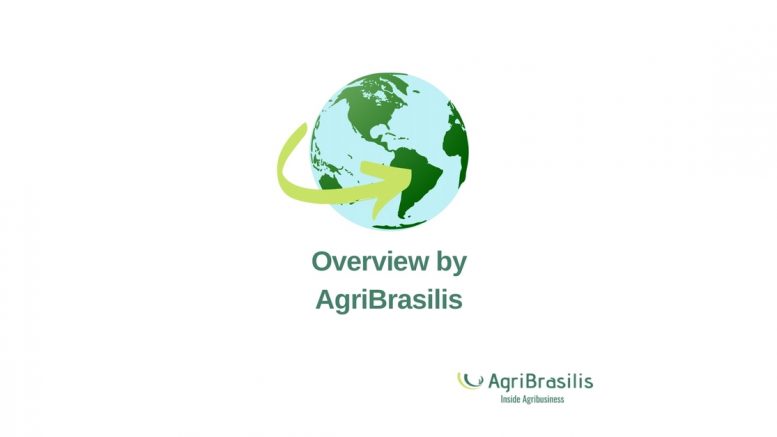Agribusiness News in Latin America
Lack of rain for almost 30 days, since May 25th, in the Pampas Region. In May, there was uneven rainfall distribution, reaching only 10% of the expected. Experts say it is the first time in 14 years that it is not possible to plant wheat because of lack of water. (Rosário Stock Exchange)
Organic production increased in the past 25 years. From 5,500 hectares in 1995 to 4.3 million hectares in 2022. (University of Buenos Aires)
USA’s Food and Drug Administration approves GMO wheat after a process of almost four years. Bioceres HB4 wheat has already been approved in Brazil, Colombia, Australia and New Zealand. International context is of high demand for wheat due to war between Russia and Ukraine and closing of exports from India. (FDA; Bioceres)
Urea price decreases US$ 150/tonne, reaching US$ 830. In May, imports were 97.6 thousand tonnes, with an average FOB price of US$ 949/tonne. (Commercial Report of Inputs, Grupo Az)
One in every four jobs in the country is related to agribusiness, that generates 3.7 million jobs. Main sector is beef. (Agricultural Foundation for the Development of Argentina)
Biggest import of pork in the past 20 years worries national pig farmer chain, especially with regard to imports from Brazil. In 2022, 70% of Brazilian pork samples tested positive for ractopamine, a drug banned in Argentina. (National Agri-Food Health and Quality Service)
![]()
Low temperatures restrict banana harvest in southern São Paulo, eastern Paraná, northern Santa Catarina and Minas Gerais, reducing supply in June and causing prices to rise. (Hortifruti/Cepea)
Tilapia raised and processed by Fider Pescados in Rifaina, State of São Paulo, is exported to seven countries. Company produces approximately 10 thousand tonnes/year, exporting to the USA, Canada, Venezuela, Bangladesh, Sri Lanka and Indonesia. (Fider Pescados)
Petrovina Sementes distribution center was inaugurated, with storage capacity of 260 thousand bags of seeds in Lucas do Rio Verde, State of Mato Grosso. (Petrovina Sementes)
Broiler chick production continues to show negative results for the 5th consecutive month. (Brazilian Association of Broiler Chicken Producers)
Increased the number of meteorological stations in State of Rio Grande do Sul. By 2023, there shall be 100 climate data collection points coordinated by the Agroclimatic Monitoring and Alert System. (Simagro)
Shortage of cattle for slaughter in the State of Paraná harms slaughterhouses. State’s current status as a foot-and-mouth disease-free area without vaccination restricts the possibility of animals entering, reducing their availability. (Sindicarne – PR)
Arauco, a logging company from Chile, announces an investment of approximately US$ 3 billion to build its 5th pulp mill in the State of Mato Grosso do Sul. (Arauco)

![]()
Zorzal INIA bean (Phaseolus vulgaris L.), developed in 2018 by the Agricultural Research Institute, is the most consumed in the country and it is cultivated by 85% of farmers. Variety has a short development cycle, between 100 and 105 days, demanding less water consumption. (INIA)
Six cities in Tamaulipas were declared free of pink bollworm (Pectinophora gossypiella) through sampling, insect capture and diagnosis. Pest can damage up to 40% of bolls, seeds and cotton fibers, rendering them useless for trade. (National Agri-Food Health, Safety and Quality Service)
Government delivers fertilizer for free to farmers in Tlaxcala, benefiting approximately 23,000 corn and vegetable farmers. (Secretary of Agriculture)

![]()
Growth of passion fruit exports, reaching 22,789 tonnes and US$ 54 million. Main buyers are the Netherlands, USA and Chile. (FreshFruit Consulting)
Urea purchase was canceled. New bidding will be held to meet requirements and criteria of transparency and security, in addition to determining who will receive the product and who will register and distribute the material. (Ministry of Agriculture)
Even with the truckers’ strike across the country, approximately 10 thousand tonnes of products such as vegetables, fruits and vegetables were supplied in the markets of Lima. (Ministry of Agriculture)
![]()
Allowed imports of bone-in meat from Brazil. It shall be from Brazilian states with “Foot-and-mouth disease free without vaccination” status. The objective is to make a cheaper product available on the domestic market with adequate sanitary conditions for the population. (Ministry of Agriculture)
Phytosanitary alert because of detection of specimens of the “red palm weevil” (Rynchophorus ferrugineus) in palm trees of the species Phoenix canariensis in the department of Canelones. Until then, plague was absent from Uruguay. Plan is being prepared for management and eradication of the pest. (General Directorate of Agricultural Services)
Fish exports in first half of 2022 were the highest in seven years, reaching 25 thousand tonnes, totaling US$ 49.3 million. (Ministry of Agriculture)
Government announces refund of US$ 65 million to 850 milk farmers. It will be the 3rd reimbursement that takes place based on surplus generated by the Fund for Financing and Sustainable Development of the Milk Activity. (Ministry of Agriculture)
![]()
In the past three years, country lost approximately 40% of its farm workers due to economic difficulties faced by farmers, such as rainfall, lack of energy, equipment and fuel. (Fedeagro)

MORE AGRIBUSINESS NEWS:

